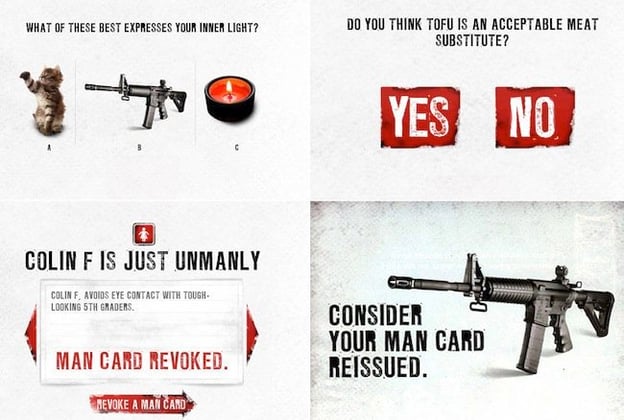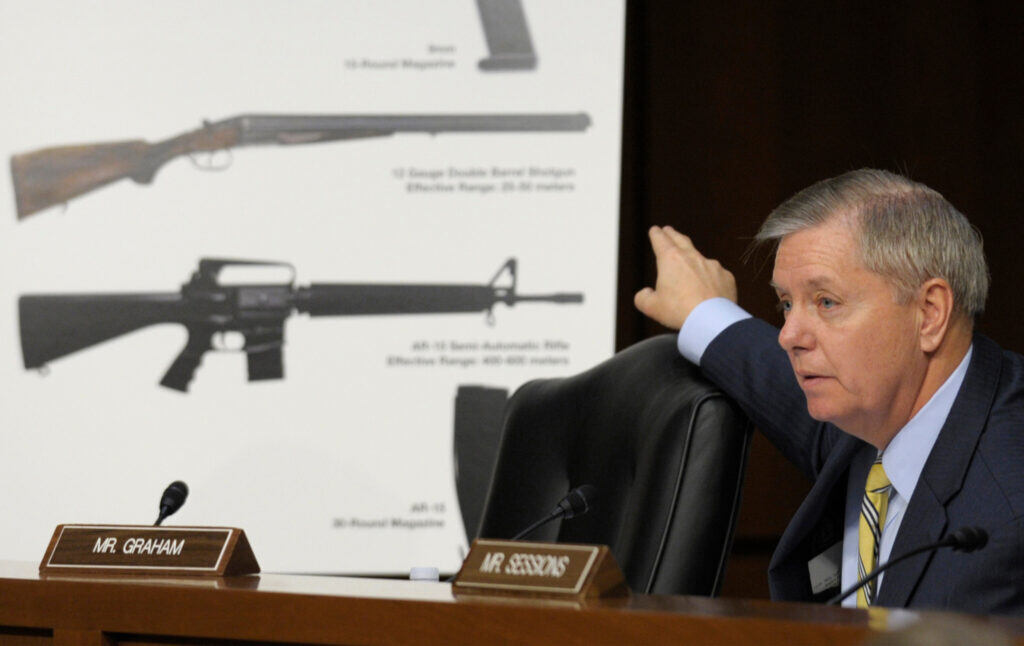
Congressional Inaction Will Ensure More Deaths Due to Gun Violence
Is it possible, in the wake of the horrific tragedies last month, to have an honest conversation about gun culture that’s separate and apart from gun ownership?
How do we address cultural problems such as attitudes toward guns?
Can we get past bad faith arguments on both sides?
Is it possible to legislate culture?
These are questions that have been on my mind in the last month since 10 people were killed in a Buffalo, New York supermarket by a self-described white supremacist and 19 children and 2 teachers were murdered in Uvalde, Texas.
Since those two incidents, the country has been embroiled in deep, largely good faith conversation about how to prevent incidents like in the future. The depravity of these events—the repugnance of the Buffalo shooter’s open hatred of Black and Jewish people, the absolute cruelty of the Uvalde gunman targeting elementary school children—has fostered a real appetite for reform. The question remains: what do we do?
Historically, solutions have been split on a partisan basis. Conservatives, wary of infringements on Second Amendment rights, have been hesitant to adopt gun control measures, which they see as part of a larger liberal agenda to make it next-to-impossible to own guns. Instead, they tend to emphasize mental health interventions and the insidious influence of violent video games. They tend to call for increased funding for police along with an increased police presence in schools. Sometimes they even call for teachers to be armed. And then, there’s the pot psychosis thesis:
Ingraham: Why aren’t people in general not talking more about the pot psychosis violent behavior connection? pic.twitter.com/SKBU5QWFBZ
— Acyn (@Acyn) June 1, 2022
Liberals see these policy interventions as insufficient at best, and as bad faith distractions at worst. Because conservatives, ideologically committed to small government at all cost, rarely if ever propose the types of mental health interventions (such as universal health care or funding for mental health institutions) that might actually prevent men and boys from becoming mass shooters—liberals tend to be somewhat dismissive of arguments about mental health as a primary cause. The same goes for violence in video games. Liberals interpret this focus as an excuse to avoid the issue of guns—especially since decades of research has shown that while violent video games may have a desensitizing effect on kids, they do not cause the type of violence we’ve seen over the last few weeks.
By all accounts, first responders could have performed better in Uvalde. The shooter was left to his own devices for an hour before being killed; worried parents were handcuffed or Tasered when they tried to look for their children or asked police to do something. Now even conservative voters are shooting down suggestions from Ted Cruz and other top-NRA money recipients that the answer is more “good guys with guns” in school. Enough “school resource officers” have abandoned their posts during mass shootings for most people to have good reason to give up on the idea that they should put their children’s lives in these people’s hands.
So, what do liberals have on offer?
Liberals are inclined toward policies that make guns less accessible to those who are inclined to commit violence against human beings. Some policies advocated by the left target specific types of guns that are frequently used in mass shootings—rationalizing that if a certain type of gun, like an AR-15, is attractive to mass shooters, for whatever reason, they should not be sold to civilians—or at least that would-be buyers should be subject to a higher bar when it comes to background checks or waiting periods. To the extent that conservatives argue that other guns could be used, or are equally dangerous, the liberal response is to say that those guns should be more difficult to obtain, too. Most liberals don’t have an ideological opposition to gun ownership in principle, but when weighing the pros of gun ownership against the cons of mass shooting, suicides, and organized crime, liberals tend to believe restrictions on gun ownership are worth the cost.
Conservatives feel differently, and the tacit message is that mass shooting events like the one at Uvalde are the necessary price paid for freedom. Liberals point to other parts of the free world that don’t suffer from America’s unique gun violence problem and argue that America’s policy priorities are in the wrong place. A world where children are massacred at school—no matter how infrequently—is not a free world, they say. And countries like Australia, which responded to a massacre in 1996 that left 35 dead with a gun buyback program, offer an important example America should follow. Australia made a number of guns frequently used in shootings illegal, and then offered above-market payments for folks to turn in those guns without penalty—even if they were illegal. This resulted in about 20 percent of privately owned Australian guns being turned in. Eighty percent of guns remained in circulation, but mass shootings stopped. The efficacy of this approach, however, is rarely engaged with by conservative politicians and pundits. Instead, it’s presumed that such a program would not work in the United States, and that even 19 dead children aren’t enough to make it worth a try.
Now, there seems to be some bipartisan consensus around red flag laws, which “permit police or family members to petition a state court to order the temporary removal of firearms from a person who may present a danger to others or themselves. A judge makes the determination to issue the order based on statements and actions made by the gun owner in question.”
Red flag laws might be one of few policies widely supported on a bipartisan basis, though the NRA and conservatives like Marjorie Tayalor Green and Dan Crenshaw oppose them, and where they’ve been implemented, they’ve been successful. A Duke University study in 2016 concluded that Connecticut’s red flag law averted around one suicide for every 10 to 20 gun seizure cases.
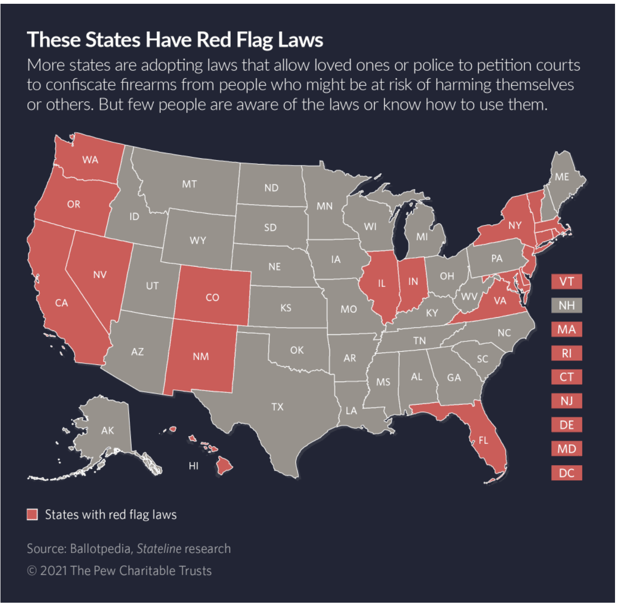
Red flag laws were successfully adopted in Florida, signed by Republican Governor Rick Scott after the Parkland shooting in 2018, and even since the shooting in Uvalde, several prospective shooters have been flagged following posts on their social media accounts, potentially averting more death.
I’m glad there is a growing consensus around Red Flag laws. But even Republican legislators who have supported them on the state level reject them on the federal level, leaving the majority of the country, including Texans, vulnerable due to the whims of politicians like Crenshaw. But I remain frustrated that common sense suggestions from both sides aren’t getting more of an airing because of the presumed bad faith of the quote-unquote “other side.”
Age restrictions seem to be an obvious idea if we want to prevent school shootings. According to a database project from the Washington Post which tracks every act of gunfire at primary or secondary school during school hours since the Columbine massacre in 1999, more than two-thirds were committed by shooters under 18. The average age for school shooters was 16.
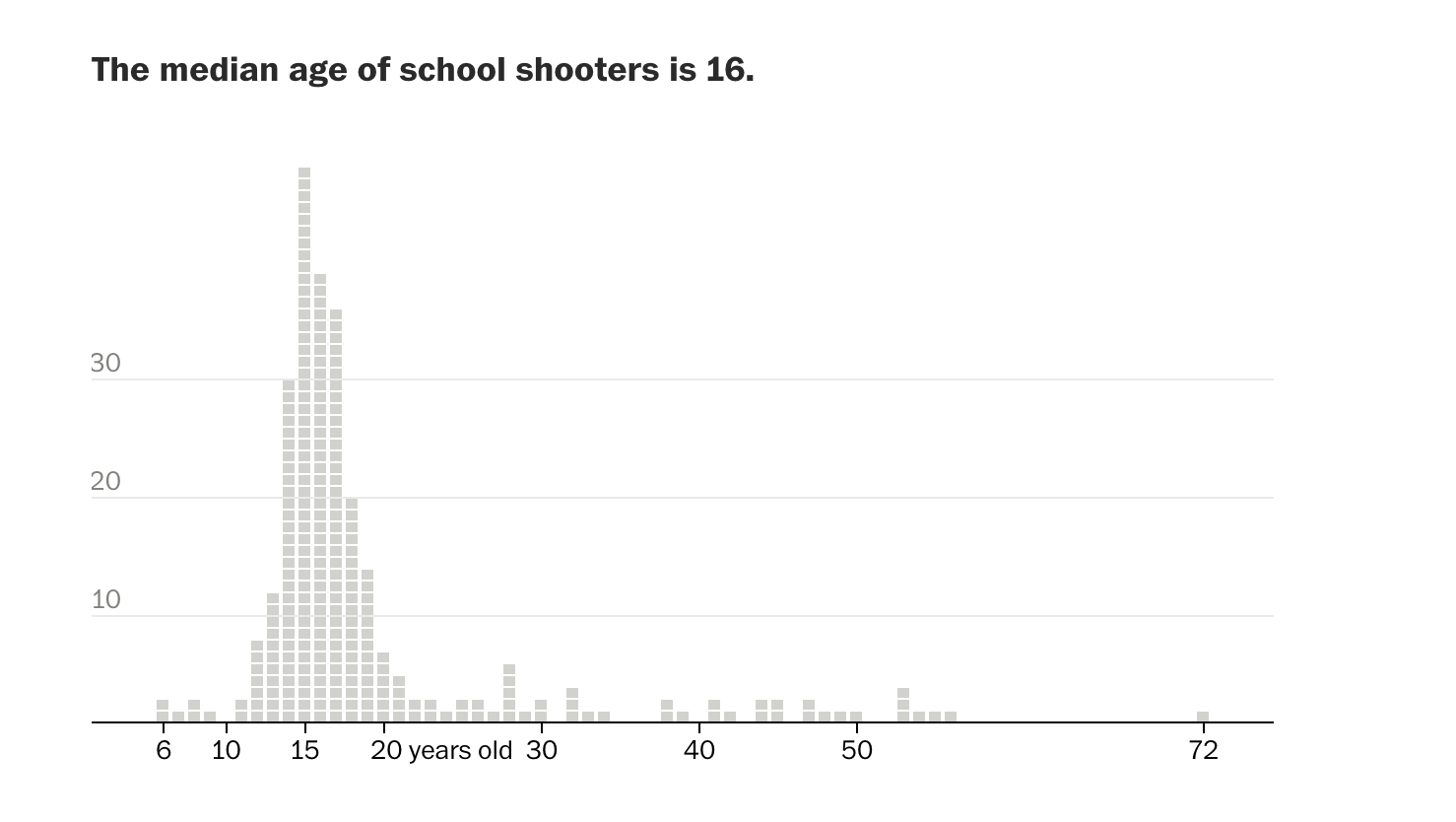
Even outside of school shootings, 26 percent of all mass shootings are perpetrated by men under the age of 25. The Uvalde shooter bought the gun he used to 19 children and two teachers legally—a day after his 18th birthday. The Buffalo shooter, also 18, legally purchased his gun in New York, and unlike the Uvalde shooter, had no red flags that would’ve triggered the state’s red flag laws. What could have stopped him, however, is preventing access to the gun in the first place. (It’s also worth mentioning that he used a high capacity magazine that is illegal in New York state, which only allows the purchase of magazines that shoot 10 rounds outside of a shooting competition. This underscores why it’s so important to have federal gun legislation.)
But Republican politicians so far seem to oppose it. Listen to this dodge by Dan Crenshaw being interviewed by Dana Bash on May 29:
Bash:
Should you be 21 to buy a gun?
Crenshaw:
Well I think the question we have to ask ourselves is, should 21 be the age that you’re an adult? As a society, we do have to decide when, technically, you’re an adult.
Dana Bash:
Well, should it be?
Crenshaw:
Right now, we technically, say, well, look, I’m not very impressed by our current swath of our 18-year-olds and their maturity levels. So maybe we should have that conversation. But then it has to apply broadly. It has to mean that you are not an adult until 21. And then, you know, what happens then? When we see a 22-year-old commit an atrocity, are we going to raise it again? At a certain point we have to ask ourselves for our limiting principles as far as that age limit.
Bash:
Well, I mean…
Crenshaw:
The vast majority of horrible shootings have been committed by an older person.
Bash:
… don’t finish developing until the mid-20s. There’s medical studies showing that the teenage brain just isn’t fully developed.
Crenshaw:
That’s true. And does that mean … I think it’s 26, actually. And so does that mean you’re not an adult until 26? I mean, I think I was on my second deployment by then. So, you know, these are hard questions. We’re grasping for an answer.
Bash:
These are hard questions. Congressman … there are a lot of people hearing you say No to a lot of the solutions people are talking about. So what people want to know is, what is the solution? What would you agree with? Because the way that the answers are coming out now is that nothing’s going to change. And I don’t think people here in this community and across the country want to hear that after their babies are being massacred by these guns.
Crenshaw:
What I think needs to change is the things that would have the most immediate and succinct effect—tangible effect on these things. And that’s actual security at a school.
Of course, raising the age of gun ownership does not require a comprehensive review of when a person becomes an adult, any more than requiring people to be 25 to rent a car does. And it’s this kind of bad faith response that stands in the way of common sense reforms.
As for liberals, I’m frustrated by the extent to which the mental health conversation is shut down without an airing. While I understand why “mental health” is seen as a right-wing pretext to avoid a substantive conversation about gun control measures, and that this argument can bring an undue stigma to people with mental health issues—the overwhelming majority of whom do not commit crimes—it’s quite obviously true that there’s something psychological, something cultural, going on with American men, whether they’re shooters or not. (Almost 100 percent of mass shooters are men.)
Take the connection between suicides and guns. While women attempt suicide at a higher rate, men are more successful because they use more lethal methods, such as firearms. The suicide rate among American men is on a deeply troubling upward trend.
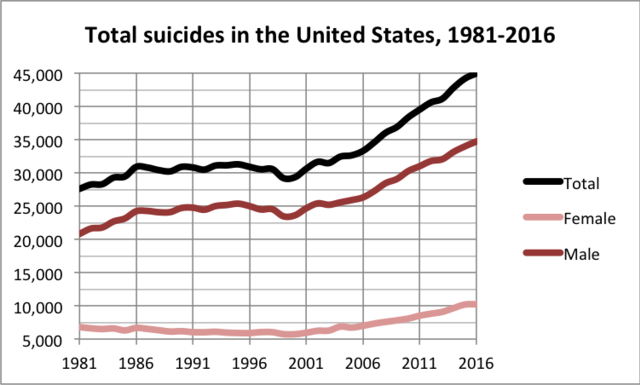
Suicide the 12th leading cause of death in the United States. The correlation between the accessibility of guns and the rate of suicide is well documented. Some Republicans brag about high gun possession-low crime rate states like Wyoming, but those states feature some of the highest suicide rates in the country. And that’s tragic.
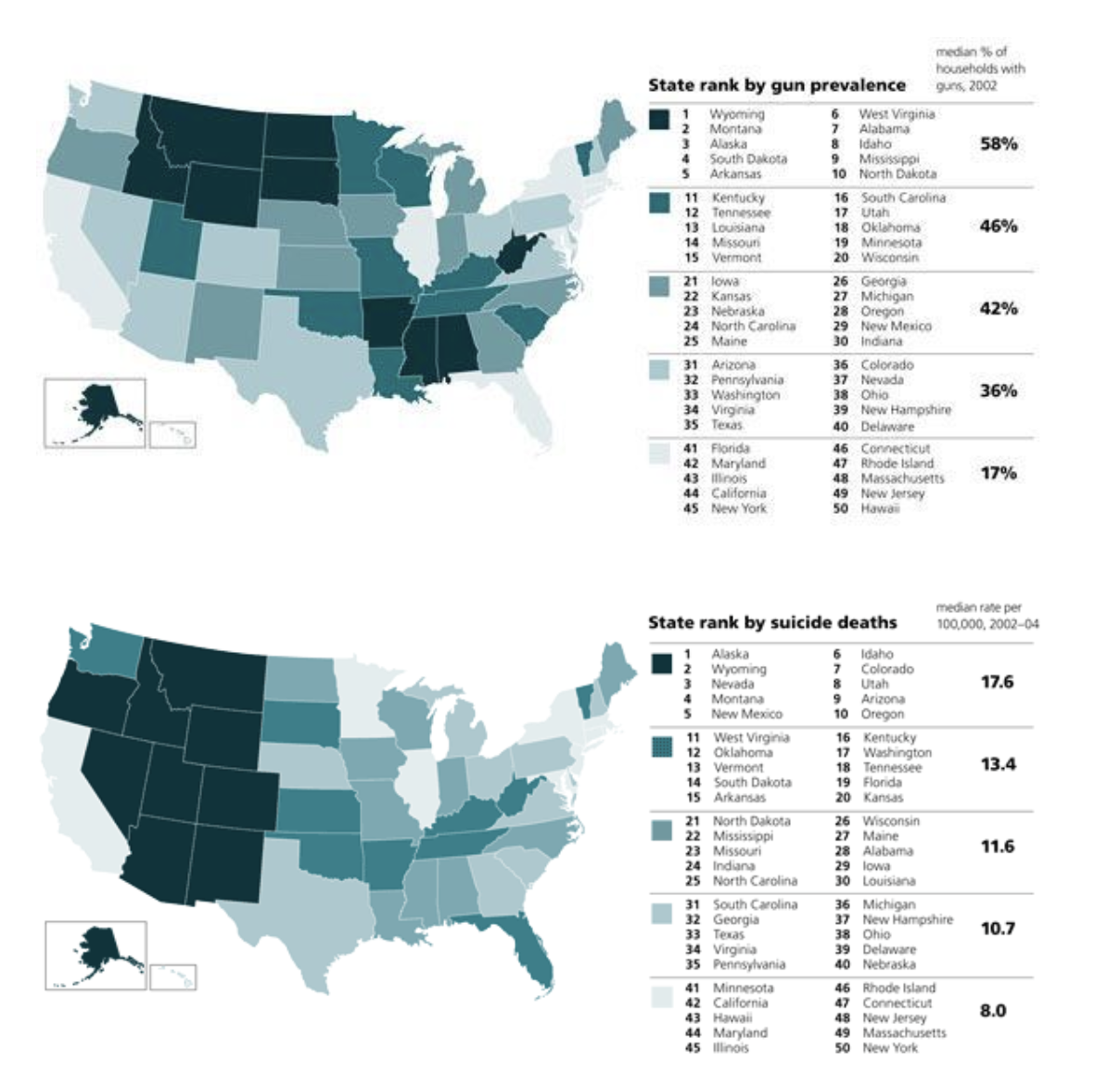
To the extent that there is a mental health problem in this country, it’s exacerbated by the gun problem, and it’s deeply frustrating to be caught in an “either or” debate that does nothing to provide for the mental health crisis or the problem of guns getting into the hands of those who would cause harm—either to themselves or to others.
Finally, I’m frustrated that there’s little appetite for folks to engage in a cultural problem that’s adjacent to the mental health crisis. Liberals are right to call out video game panic as a paper tiger, but that doesn’t mean that video games aren’t a problem in terms of the online community that they provide. Chat rooms within games have become recruiting grounds for extremists. Teenage boys who feel lonely, left behind, and like they’re losing power in society they feel entitled to, reclaim that power by participating in an “edge lord” culture, where they engage in subversive speech—less because they have a strong ideology but because it feels good to feel superior in a world where they feel anything but. And extremists know they can offer young people a scapegoat for their social and economic problems: immigrants, minorities, trans people, and social justice warriors.
As a leftist, I am at pains to admit that these kids are right: the American social contract is not being honored. But they’ve got the culprit wrong. Wage theft is rampant in America, and undocumented immigrants are not to blame. While undocumented immigrants may create some increased competition for low-wage jobs, most wage theft is executed by corporations. According to the Associated Press, “In 2019 alone, the Department of Labor cited about 8,500 employers for taking about $287 million from workers.” (And the undocumented are actually huge victims of wage theft for obvious reasons—their status means they can’t bring legal claims.)
Corporate media pundits, funded by some of the most exploitative companies, rarely focus on the real wage thieves, choosing instead to scapegoat some of the lowest earners in the country who pay billions in taxes while being unable to access social programs they fund. The worst offenders are corporations like Halliburton, G4S Wackenhut, and Circle-K stores, which have collectively taken more than $22 million from their employees since 2005. Walmart has been penalized with $1.4 billion in total wage theft settlements and fines. Banks and insurance companies are key offenders, with Bank of America paying $381 million in penalties, Wells Fargo $205 million, and JPMorgan Chase $160 million.

Here’s some testimony from one employee, Kilian Colin, from a sanctioned firm: “At Wells Fargo, aggressive sales quotas based on exploiting vulnerable customers forced me into 12 hour shifts with no breaks and no food allowed—and threats to withhold my paycheck if I didn’t sign off on working extra hours for free.” The retail sector has the highest aggregate penalties for wage theft, and that’s in a sector that has been fighting minimum wage increases that would keep up with inflation. They are fighting efforts to raise a minimum wage that hasn’t gone up since 2009, all while stealing from employees.
Young men are right: it’s bleak out there. But instead of being told who the real enemy is by honest actors in the Democratic and Republican parties, they are being propagandized by bigoted extremeists. And the corporate parties are making it easy for extremist recruiters by lowering the quality of life for average Americans—enabling Wall Street, sending jobs overseas, and declining to tax the rich—even as they steal more and more from workers.
Meanwhile, conservatives are reluctant to take a good hard look at gun culture, which goes well beyond protecting our Second Amendment rights, and instead pushes the idea that masculine value is bound up with violence.
In February, Sandy Hook victims won an unprecedented settlement against gun manufacturer Remington, despite laws shielding manufacturers from liability. Why did they win? Plaintiffs argued that the company was culpable because of the way they marketed their products to civilians as a way to kill their enemies. Not deer. Not burglars. But their human enemies.
Family members of victims argued that ads like this one, from the assault weapon manufacturer Bushmaster, which reads, “consider your man card reissued,” motivated Adam Lanza, the Sandy Hook shooter, to kill 26 people.
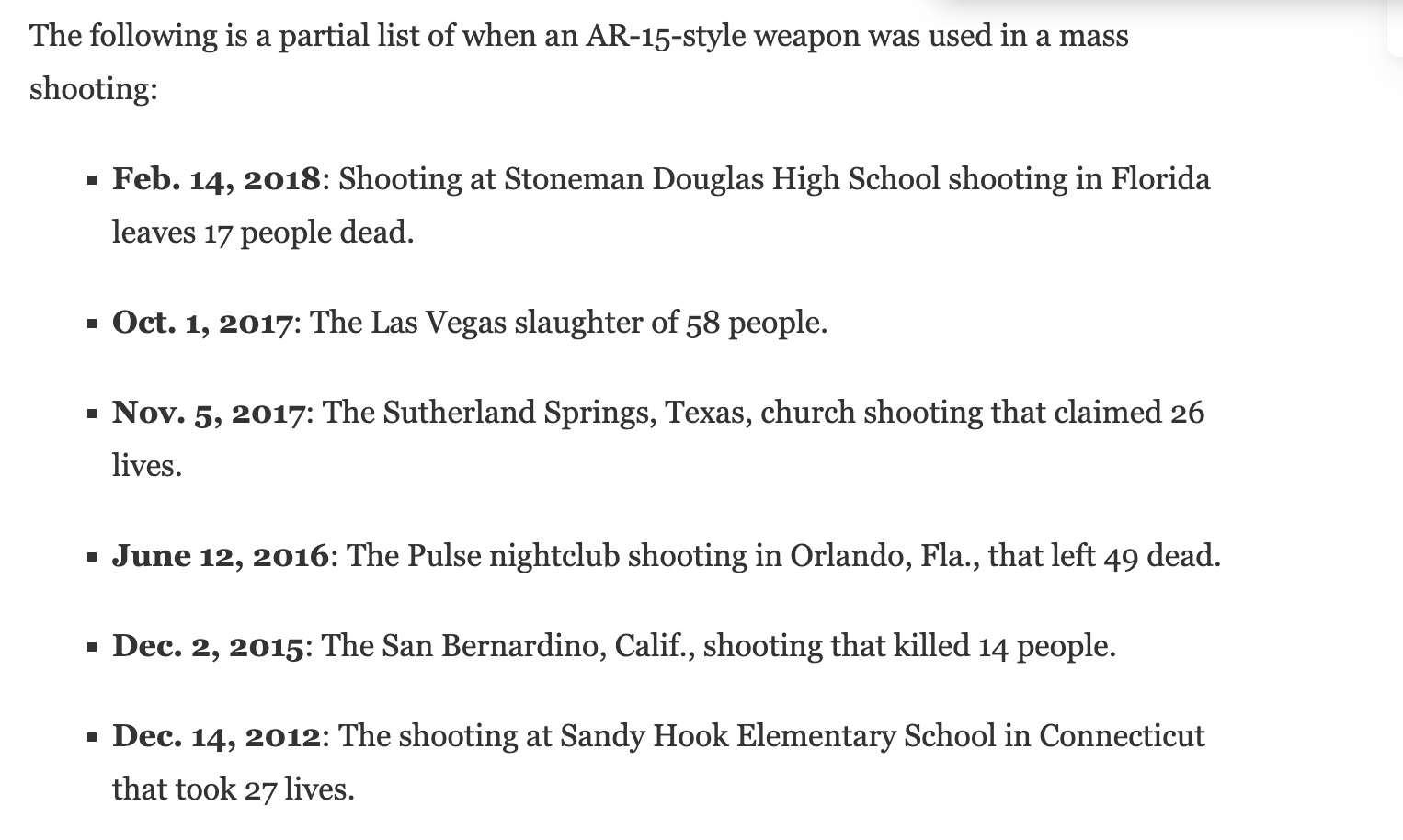
Daniel Defense is a manufacturer of the AR-15 used in the Uvalde shooting. The model was also used in the 2018 Stoneman Douglas shooting, the 2017 Las Vegas slaughter of 58 people (which also used a Daniel Defense gun), the 2017 Sutherland Springs Church shooting in Texas that killed 26 people, the Pulse Nightclub shooting which left 49 dead, the 2015 San Bernardino shooting that left 14 dead, and Sandy Hook, where 27 people died. Daniel Defense is coming under scrutiny for the following advertisement, which pushes the idea of gun ownership on younger and younger consumers.
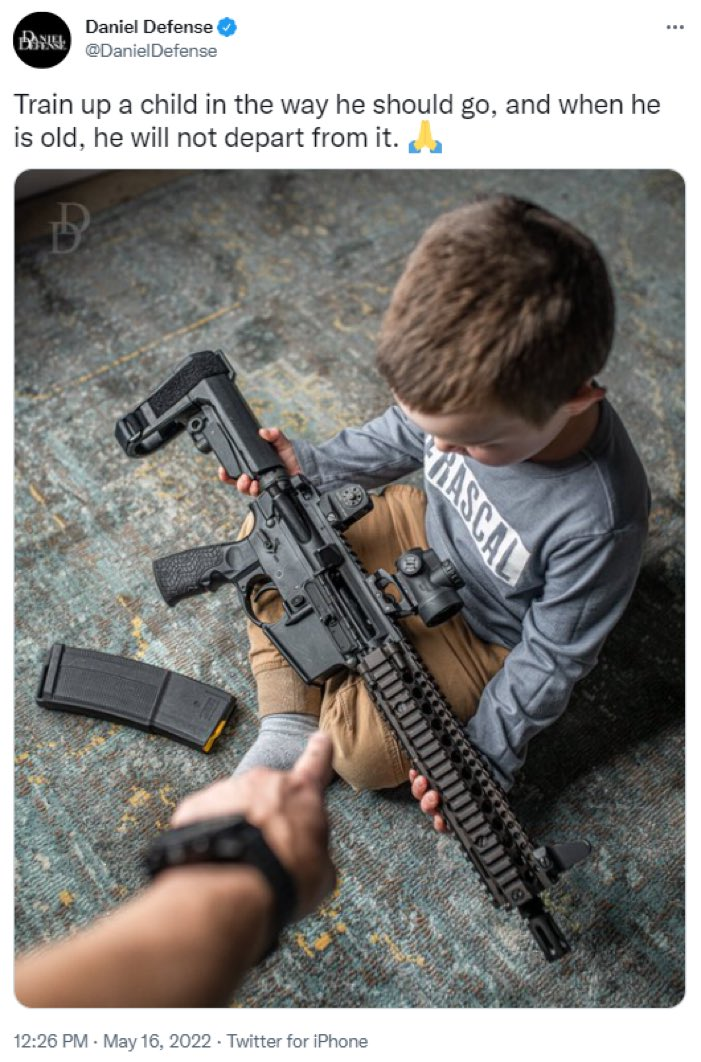
Is it possible, in the wake of the horrific tragedies this month, to have an honest conversation about gun culture that’s separate and apart from gun ownership? Can we disentangle a commitment to Second Amendment rights from a culture which glorifies military style weapons designed to kill humans? And can Americans on both sides of the ideological divide reckon with the fact that both corporate parties have created an environment so precarious, with so little support for families, that young men see violent extremism as a viable alternative to a socially productive future? Can conservatives that believe mental health is a problem join with leftists who advocate for universal mental healthcare? Can conservatives that think parents aren’t present enough in the home fight with leftists to secure for them a living wage, so they can be home in time to help their kids with their homework, or even afford to survive on one salary so one parent can be home when their child gets home from school? And can liberals take seriously the threat posed not by video games themselves but by the communication platforms they provide, and work harder to demonstrate a willingness to materially provide for all Americans, instead of relying on lip service to minority groups for votes, followed up by inaction and excuse making? Can this be a moment for a little good faith?
I’m not sure. But here’s hoping.
